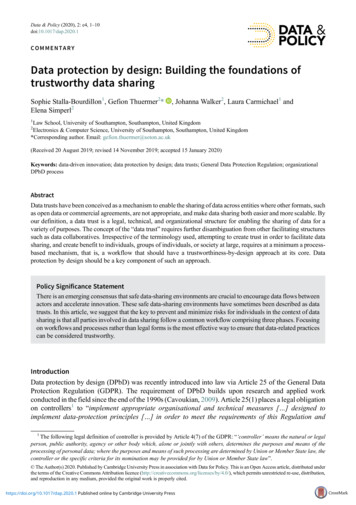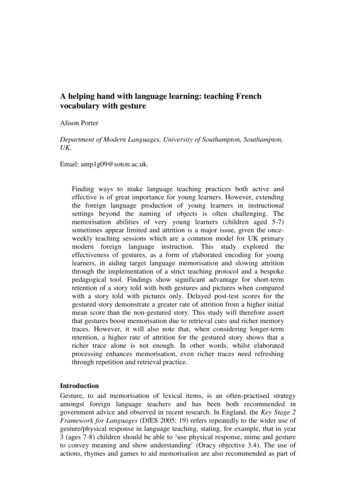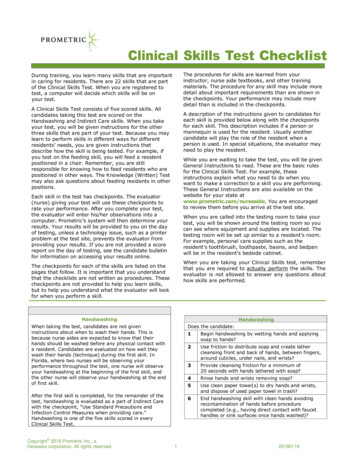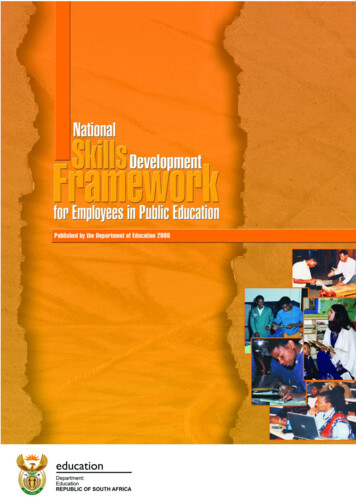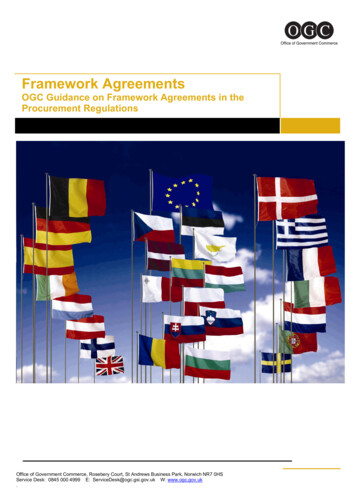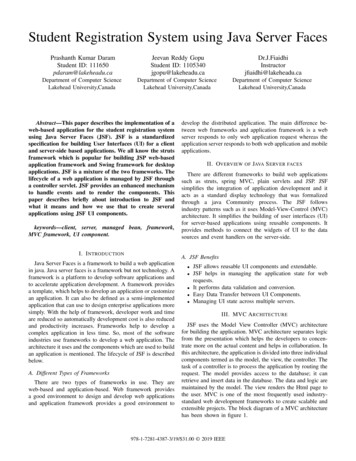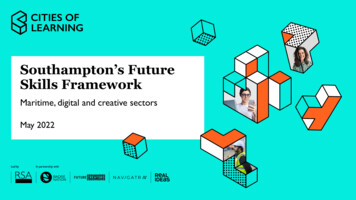
Transcription
Southampton’s FutureSkills FrameworkMaritime, digital and creative sectorsMay 2022
Contents Introduction 3 Methodology .4 Why Southampton needs a skills framework .6 Rationale for strategic sector skills frameworks 7 Core skills framework 10 Sector skills framework: digital .14 Sector skills framework: maritime .23 Sector skills framework: culture .37 Stakeholders’ feedback 50 Appendix .592Southampton’s Future Skills Framework
IntroductionSkills frameworks describe the skills, knowledge and competencies required in different jobs. This can provide acommon language to improve communication and collaboration between employers, educators, policymakers,learners and other actors in the skills system.The RSA’s Cities of Learning programme uses digital badges to make learning, work and developmentopportunities in places more visible and measurable, and to support learners to articulate their skills andexperiences. The programme also develops pathways that connect badges together to provide new progressionroutes for learners.Together with Southampton City Council we set out to develop a local skills framework, to help inform digitalbadge writing, learning provision and other interventions that could address skills and employment challenges in thelocal area.3Southampton’s Future Skills Framework
MethodologyWe draw inspiration from a range of innovative approaches to skillsframeworks and taxonomies.Our approach uses data from over 300,000 local online job adverts,provided by our research partners Emsi to identify: Skills in-demand across most occupations in the city (i.e.core/transferrable skills). Skills in-demand for strategic industries such as maritime, digital andcreative and culture, tourism and the visitor economy.We complement this with qualitative insights from local stakeholders. Ouranalysis also situates our findings in the wider literature on the future of workand skills.4Southampton’s Future Skills Framework
5Figure 1: Southampton skills framework overview (RSAanalysis of Emsi Burning Glass Job Posting Analytics)
Why Southampton needs a skills frameworkA skills framework for Southampton would help ensure that residents have the skills needed to meet the city’sstrategic ambitions as well as address future of work challenges such as automation and Covid-19.By providing insights on current and emerging skills demands, a skills framework could have the followingimpact on different stakeholders in the learning system:1. Employers will be able to better recognise these skills, invest in appropriate training, develop progressionpathways and align job design and recruitment with the changing needs of industry.2. Learners and workers will be able to communicate their existing skills more effectively and make betterdecisions about upskilling and reskilling opportunities.3. Educators will be able to be design training programmes that better align with emerging skills demandsand ensure that all learners are equipped with the core/transferrable skills needed across a range ofoccupations.6Southampton’s Future Skills Framework
Rationale for strategic sector skills frameworks7DigitalMaritimeCreativeIT professionals are one of the fastestgrowing occupations in Southampton andthese roles will become increasinglyimportant as more traditional sectors ofthe economy undergo digitaltransformation. The city has attractedlarge firms such as Starling bank and isgrowing its profile as a tech start-up hub.Southampton is a centre of maritimeexcellence. However, the sector isexpected to undergo significanttransformation in the coming years asautomation and decarbonisation createnew skills demands. Freeports representa growth opportunity and the city hasambitions to lead on the development ofautonomous vessels.Southampton are bidding for City ofCulture 2025. The 2021 award isexpected to have created 900 jobs inCoventry and contributing 211m to theeconomy. Longer term, the aspiration isthat the bid will make the Southampton amore vibrant place to live and help toimprove graduate retention.Southampton’s Future Skills Framework
CASE STUDY #1:Singapore’sSkillsFrameworkSkills frameworks are an integral part of Singapore’sindustry transformation maps that are co-created byemployers, educators, unions, industry associationsand government. Over 30 skills frameworks havebeen developed for strategically important sectors,detailing information on job roles, career pathwaysand skills demands, alongside lists of existingtraining programmes. In total, these frameworksdocument approximately 51,000 abilities and55,000 knowledge types, underpinning more than8,000 unique technical skills.
CASE STUDY #2:Nesta’sSkillsTaxonomyThe UK’s first skills taxonomy was developed byNesta and Burning Glass using data from 41m onlinejob adverts. Machine learning was used tohierarchically cluster skills, meaning the morefrequently they appeared in similar adverts, themore likely they ended up in the same branch of thetaxonomy. The taxonomy also estimates change indemand for each skill cluster over recent years andtheir value (based on advertised salaries).According to Nesta, one of the benefits of usingonline job adverts to create a taxonomy is that itensures it is based on the language actually used byemployers, rather than academics or policy makers.However, more recently they have recognised thelimitations of this approach. Not all jobs areadvertised online and not all skills are mentionedwithin job adverts. To avoid these pitfalls, futureversions of the skills taxonomy will combine thetimeliness of job adverts with the breadth of theESCO, an already existing expert frameworkdeveloped by the European Commission.
Core skillsframeworks
Our approach: core skills framework1. We analysed a list of the top 250 most in-demand skills in Southampton according to Emsionline job vacancies data. This list included skills that are specific to some of the most widely advertisedjobs such as computer programmers and nurses.2. We filtered out these skills to identify core skills for the city that are prevalent across a widerange of occupations in the city and widely considered as transferrable in the literature on the future ofwork and skills.3. We used the ESCO (European Skills, Competences and Occupations) skills hierarchy toenrich this dataset and cluster skills into a framework for the city. Along with the US O*NET(Occupational Information Network), the ESCO is one of the most well known and widely used skillsframeworks.4. We engaged with local stakeholders to stress test a draft skills framework, to ensure that theoverarching language resonated and identify potential gaps based on current and emerging skills demands.11Southampton’s Future Skills Framework
Core skills frameworksDuring our analysis, we identified a total of 50 core skillsfor the city of Southampton. The top 5 skills mostreferenced in online job vacancies were communications,management, customer service, enthusiasm and planning.More generally, core skills can be found across severalbroad ESCO categories. Although they are particularlyconcentrated in communication, collaboration andcreativity, management skills and computer literacy.Several, including self-motivation and resilience, are whatthe ESCO skills hierarchy describes as attitudes and values(and are often also be described as non-cognitive skills).When developing our sector skills frameworks, we assumethat these core skills are relevant across all roles and onlyprofile non-core skills that are more specific to thesector.12Southampton’s Future Skills FrameworkPercent of total job postings that reference elf-MotivationDetail OrientedLeadershipInnovationProblem SolvingInterpersonal CommunicationsBasic MathPresentationsMicrosoft ExcelInfluencing SkillsMicrosoft OfficeTime ManagementTraining And DevelopmentComputer LiteracyTeamworkProfessionalismMentorshipMicrosoft OutlookResilienceVerbal Communication Skills5%10%15%20%25%A1 - attitudesS1 communication,collaboration andcreativityS4 - managementskillsS5 - working withcomputersS2 - informationskillsFigure 2: Top core skills in Southampton by ESCO pillar(RSA analysis of Emsi Burning Glass Job Posting Analytics)
Figure 3: Southampton coreskills framework (RSA analysis ofEmsi Burning Glass Job PostingAnalytics)13
Sector skillsframeworks
Our approach: sector skills frameworks1. We analysed employment data to identify occupations that are important to theSouthampton’s strategic sectors: digital, maritime and culture, creative and visitor economy. We definethese strategic sectors as a combination of 2-digit Standard Industrial Classification (SIC) codes.2. We analysed online jobs vacancies data to identify the most important non-core skills forthese occupations. This analysis is based on a combination of 3- and 4-digit Standard OccupationalClassification (SOC) codes. While our dataset was initially structured around 3-digit SOC codes, we foundthat 4-digit SOC codes were necessary to provide more detailed insights for some of Southampton’sstrategic sectors.3. After building skills profiles for selected occupations in Southampton’s strategic sectors, wedevelop a draft skills framework for each group of occupations. This is loosely based on the ESCOhierarchy but in some cases, where ESCO provides insufficient detail, we diverge from this to define newbranches, drawing on insights from our literature review of future skills demands across these sectors.4. We engaged with local stakeholders to stress test these draft skills frameworks, to ensure thatthe overarching language resonated and identify potential gaps based on current and emerging skillsdemands.15Southampton’s Future Skills Framework
SECTOR SKILLS FRAMEWORK:Digital Sector16Southampton’s Future Skills Framework
Defining digital jobsAccording to the Department for Digital, Culture, Mediaand Sport (DCMS), digital includes a range of sectors. Mostof Southampton’s employment in digital is in computerprogramming, consultancy and related activities.Within digital sectors in Southampton there is one mainoccupation group: IT and telecommunicationsprofessionals.Although this occupation group encompasses a diverserange of different roles, from computer programmers toproject managers and cyber security professionals. Toensure that we provide sufficient detail on these roles weuse more detailed 4-digit SOC codes for this occupationalgroup.We also include data on the skills most in-demand for ITtechnicians and engineers. In this sense, our digital sectorskills framework focuses on skills for digital jobs, ratherthan those in sales or auxiliary business services. Thesedigital jobs can be found across a range of industries.17Southampton’s Future Skills Framework020040060080010001200Information technology andtelecommunications professionalsFunctional managers and directorsSales, marketing and related associateprofessionalsInformation technology techniciansBusiness, research and administrativeprofessionalsElectrical and electronic tradesOther administrative occupationsAdministrative occupations: financeCustomer service occupationsProduction managers and directorsComputer programming, consultancy and related activitiesOther digitalFigure 4: Employment in digital sectors byoccupational group (RSA analysis of Emsi Burning Glass2021.1)
Developing a frameworkDuring our analysis we found identified around 100 skillsthat are important to digital jobs. Around 15 of these alsoappeared in our core skills framework.Aside from core skills, we initially group digital skills intoto 3 broad categories that are more or less prevalent indifferent roles. For example, programmers and webdevelopers have very different skills requirements to ITproject managers and business analysts. Cyber securityprofessionals are included in the n.e.c. grouping. Computer programming and webdevelopment: includes programming languages andother tools, frameworks and libraries. Maintaining computers and networks: includesskills that relate to operating systems and servers,cybersecurity and general technical support. 18Software development and projectmanagement: includes agile methodologies such asScrum and other project management approaches.Southampton’s Future Skills FrameworkTotalemployment(2019)Total uniquejob postings(2015-20)Programmers and SoftwareDevelopment Professionals9928890Information technology technicians7704098IT Specialist Managers7382369Information Technology andTelecommunications Professionalsn.e.c.4962662IT Business Analysts, Architects andSystems Designers4022029IT Project and Programme Managers 238435Web Design and DevelopmentProfessionals3835142Figure 5: Employment and unique job postings in digital roles by detailedoccupation group (RSA analysis of Emsi Burning Glass Job Posting Analytics andEmsi Burning Glass 2021.1)
Figure 6: Southampton digital skills framework (RSAanalysis of Emsi Burning Glass Job Posting Analytics)19
Figure 7: Southampton digital skills mapped to occupations (RSAanalysis of Emsi Burning Glass Job Posting Analytics)
Key findings from evidence review: digitalThe RSA has previously identified the digital sector as one that isresilient to automation but also likely to experience growth in responseCovid-19, as the pandemic is accelerating the pace of technologicalchange.IT professionals were one of the fastest growing occupations inSouthampton between 2011-19. While these jobs are also highly paid,the challenge of gender diversity is well documented, with womencurrently only accounting for 18% of IT specialists in the EU.A 2019 study suggests that hi-tech jobs growth also creates local jobs innon-tradeable services such as retail, hospitality, personal services andconstruction (‘the Shoreditch effect’?), most of which are filled by lowerskilled workers.In-demand jobsIn-demand skills NET DeveloperJava DeveloperFront End DeveloperDevOps EngineerFull Stack DeveloperDeveloper C#Business AnalystSoftware DeveloperDeveloper .Net C#PHP DeveloperCyber securityCloudIT supportCodingData analyticsArtificial intelligenceWeb designing & UXOur analysis aligns with evidence on what jobs and skills are mostdemand in the digital sector, such as those identified by the Tech JobsBarometer.21Southampton’s Future Skills FrameworkFigure 8: Most in-demand tech skills and jobs according to theTech Jobs Barometer (Tech UK and CW Jobs)
However, apart from SQL and Python, skills associatedwith data science and machine learning don’t appear as indemand for IT professionals and technicians. This is likelydue to how these roles are defined in SOC codes butcould also reflect relatively low current demand in the city.Following further investigation, we used the Emsi JobTitles Library rather than SOC codes to search for themost important skills across a range of Data ScienceProfessionals at the UK level.Critically, our analysis may not also capture some of theskills associated with emerging technologies. For example,the World Economic Forum suggest that as well as someof the roles that have been profiled, demand for roboticsengineers and Internet of Things (IoT) specialists is alsogrowing. Southampton has expressed ambitions to createan augmented and virtual reality cluster.Similarly, while Microsoft Azure does appear as in-demandacross most digital jobs, this may not fully captured theskills required for cloud computing. While encryptiondoes not currently feature as a skill in-demand for cybersecurity professionals.22Southampton’s Future Skills FrameworkTotal unique postings that reference skill05001000 1500 2000 2500 3000 3500Data SciencePython (Programming Language)Machine LearningR (Programming Language)SQL (Programming Language)Big DataData AnalysisApache SparkApache HadoopArtificial IntelligenceAlgorithmsStatisticsJava (Programming Language)Computer ScienceAmazon Web ServicesSAS (Software)Tableau (Business Intelligence Software)Data VisualizationData EngineeringAgile MethodologyFigure 9: Most important non-core skills for Data Science Professionals(RSA analysis of Emsi Burning Glass Job Posting Analytics)gig
SECTOR SKILLS FRAMEWORK:Maritime Sector23Southampton’s Future Skills Framework
Defining maritime jobsWe draw on research conducted by the Centre forEconomics and Business Research (Cebr) to define themaritime sector. According to their analysis of theeconomic contribution of sector to the Solent region,maritime includes a diverse range of industries. Ouranalysis focuses on the shipping and port industry as wellas marine engineering.These maritime industries collectively employ almost6,000 workers in Southampton, the majority of whichwork in shipping and ports. According to the Cebr thissector comprises of a range of industries that are notexclusively related to maritime and hence don’t mapneatly onto SIC and SOC codes. We use the Emsi JobTitles Library rather than SOC codes to search for themost important skills across Maritime Business ServiceProfessional roles at the UK level.0Southampton’s Future Skills Framework10001500200025005010 : Sea and coastal passenger watertransport5222 : Service activities incidental towater transportation5224 : Cargo handling5210 : Warehousing and storage3315 : Repair and maintenance of shipsand boats3011 : Building of ships and floatingstructures3012 : Building of pleasure and sportingboats5020 : Sea and coastal freight watertransport5030 : Inland passenger water transportShipping24500PortsMarine engineeringFigure 10: Employment in maritime by detailed industry (RSA analysis ofBusiness Register and Employment Survey)
Defining maritime jobs:shipping and portsWithin the shipping and ports industries in Southamptonthere are several main roles, including transport associateprofessionals (includes ship and hovercraft officers), otherdrivers and transport operatives (includes marine andwaterway transport operatives). However, since thesemaritime roles are not well captured by online jobvacancies data, we are unable to identify associated skillsdemands through Emsi data. We draw on other sources toprovide a broad overview of the skills required for theseroles. Managers and directors in transport and logistics,road transport drivers, administrative occupations:records and elementary storage occupations are otherimportant roles for the port industry that we are able toinclude in our skills framework. While leisure and travelservices are an important for the cruise and yachtingindustry, we profile these roles separately in our creative,culture and visitor economy skills framework.25Southampton’s Future Skills Framework0200ShippingPorts400600800Other drivers and transportoperativesElementary storage occupationsAdministrative occupations:recordsSales, marketing and relatedassociate professionalsTransport associate professionalsPublic services and other associateprofessionalsLeisure and travel servicesManagers and directors intransport and logisticsRoad transport driversOther administrative occupationsFigure 11: Employment in maritime shipping and ports sectors by occupationgroup (RSA analysis of Emsi Burning Glass 2021.1)
Defining maritime jobs: engineeringEngineering has a considerably smaller employment footprint than shipping andports. For example, around 400 workers are employed in the building of shipswhile 350 are involved in repair and maintenance. However, these roles areparticularly important to include since there is evidence to suggest that there050100150200250Electrical and Electronic TradesEngineering Professionalsare skills shortages in these roles that are inhibiting the sector. According to arecent study by the University of Southampton – local skills shortages areVehicle Tradesprevalent in electronics, mechanical engineering, marine and systems engineersas well as design engineers/naval architects.Environmental scientists are another in-demand role that we include in ourskills framework. These green jobs will be particularly important as the sectorworks to reduce its carbon emissions and environmental impacts. ForthcomingRSA analysis identifies water transport as one of the top ten most carbonMetal Machining, Fitting andInstrument Making TradesScience, Engineering andProduction TechniciansRepair and installation of machineryManufacture of other transport equipmentOther maritimeintensive industries, according to its greenhouse gas emissions per job.26Southampton’s Future Skills FrameworkFigure 12: Employment in maritime engineering occupations by occupationgroup and sector (RSA analysis of Emsi Burning Glass 2021.1)
Developing a skills frameworkDuring our analysis we found identified 85 skills that are importantto maritime shipping and ports jobs. 44 of these also appeared inour core skills framework. Aside from core skills, maritime skillscan be grouped according to 3 broad categories that are more orless prevalent in different roles: Business operations and management: includes skills forpeople and resource management, setting and evaluating businessstrategy (e.g. KPIs) and relates to pillars S4.1, S4.2, S4.3 and S4.6of the ESCO skills hierarchy. Sales and customer experience: includes specific salestechniques and the use of tools such as CRM and relates to pillarS1.6. Logistics trade: includes skills relating to moving, handling andsorting goods and using specialist machinery and equipment.Relates to pillars S6.1, S6.2, S6.3 and S8.1 and S8.2.27Southampton’s Future Skills Framework
Figure 13: Sector skillsframework for maritime portjobs (RSA analysis of EmsiBurning Glass Job PostingAnalytics)28
Developing a skillsframeworkDuring our analysis we found identified 76 skills that areimportant to engineering jobs. 26 of these also appeared in ourcore skills framework. Aside from core skills, engineering skillscan be grouped according to 4 categories that are commonacross most of the roles we profile: Engineering sciences: includes an extensive range ofdifferent natural sciences and engineering branches. TheESCO skills hierarchy considers this knowledge rather skills. Product design and innovation: includes skills in productdevelopment as well as tools such as computer aided design(S5.6 – using digital tools for problem solving) . Health, safety and sustainability: includes skills thatmostly relate to ensuring business operations are safe andsustainable. Business operations: includes other skills required todeliver engineering services.29Southampton’s Future Skills Framework
Figure 14: Sector skillsframework for marineengineering jobs (RSA analysisof Emsi Burning Glass JobPosting Analytics)30
Figure 15: Southampton maritime skills mapped to occupations (RSA analysis of Emsi Burning Glass Job Posting Analytics)31Southampton’s Future Skills Framework
Developing a skillsframeworkWhile the ESCO does not provide as granular insightinto current skills demands as online job vacancies data,it does have broader occupational coverage, meaning thatit can be used to address gaps in our analysis relating towater transport roles that are not well captured by thisdata.According to our analysis of the ESCO, the mostimportant skills for these roles relate to operatingwatercraft and communications equipment and ensuringhealth, safety and security by complying with guidelinesand procedures. Core skills relating to leadership andteam work are also particularly important.ESCO pillarS8 - working withmachinery andspecialised equipmentS6 - handling andmovingS4 - management skills14maintaining mechanical equipmentloading and unloading goods and, materialscleaning tools, equipment, workpieces andvehiclesdirecting operational activitiesleading and motivating610planning and scheduling events and activitiessupervising a team or group161913395718analysing and evaluating information and datamonitoring safety or securitymaintaining operational recordsfollowing instructions and procedurespractising sports1112151417working in teams20S1 - communication,collaboration andcreativitySouthampton’s Future Skills FrameworkRankcomplying with health and safety procedurescomplying with legal and organisationalguidelinesmaintaining and enforcing physical securityS3 - assisting and caring providing general assistance to peoplemonitoring, inspecting and testing equipment,systems and productsS2 - information skills32ESCO skilloperating watercraftoperating communications equipment28Figure 16: Most important skills for ships deck officers, deck crew and relatedworkers (RSA analysis of ESCO Skill-Occupation Matrix)
Developing a skillsframeworkMore detailed information on the skills needed for theseroles may be needed. Particularly for those that relate tooperating watercraft and communications equipment, aswell as ensuring health and safety. This can be found inother sources, including the recent Seafarer CadetReview report from the Maritime Skills Commission.Alongside these technical skills, the review suggests thatemployers want officers to develop a range of broadercompetencies, including facilitation, situational awarenessand 1:1 team coaching.Interestingly, the review also highlights how greaterattention is being given to the impact of long workinghours and extended periods away from home on crewmental health and that greater understanding here will beneeded from leadership in the future.33Southampton’s Future Skills Framework1. College (22 weeks)Digital literacyCargo and constructionBridge operationsSTCW basic training (basic training for seafarers, efficient deck hand, designatedsecurity dutiesEnclosed space entryTanker familiarisation2. Sea (36-42 weeks)3. College (38 weeks)Navigational MathsMaritime OperationsMaritime Law and ManagementBridge ManagementStability and Engine room OperationsShip Handling and Advanced NavigationGMDSS (Radio equipment training)STCW Advanced training (Medical First Aid and Advanced Fire Fighting)NAEST (O) (Simulator training course)SignalsHELM (O) (Human Element at Operational Level).4. Sea (36 to 42 weeks)5. College (12 weeks)Maritime ManagementSTCW Advanced Training and Certification issue (Proficiency in Survival Craft &Rescue Boats, Efficient Deck Hand, Advanced Fire Fighting, Tanker Safety course)Figure 17: Typical training route for Deck crew (Seafarer Cadet Review,Maritime Skills Commission)
Developing a skillsframeworkThe UK is a world leader in maritime business services,including shipbroking, insurance, legal and financialservices. According to PwC, these industries are largelyconcentrated in London, with maritime insuranceaccounting for around 65% of their total GVA. However,Southampton has particular strengths in education andconsulting as well as related technical services such asmarine classification. In 2014, Lloyd’s Register movedfrom London to Southampton to be closer toSouthampton University.We use the Emsi Job Titles to profile the most importantskills across Maritime Surveyor, Consultant, Analyst,Underwriter and Ship Broker roles in the UK, findingthat there is significant overlap with many of the sales,business operations and management and engineeringskills required for other roles in the sector.34Southampton’s Future Skills FrameworkTotal unique job postings that reference skill050100 150 200 250 300 350 400 450 500UnderwritingSalesOperationsAuditingInfluencing SkillsInfrastructureBusiness DevelopmentRisk ManagementNaval ArchitectureResearchStructural EngineeringSelling TechniquesFinanceCivil EngineeringConsultingMarine EngineeringNegotiationCustomer ExperienceBusiness PlanningEngineering Design ProcessFigure 18: Most important non-core skills for Maritime Business ServiceProfessionals (RSA analysis of Emsi Burning Glass Job Posting Analytics)
Key findings from evidence review: maritimeWhile most occupation groups in the maritime industryhave experienced growth in recent years, many are at arelatively high risk of automation. This includes bothmanual and administrative roles relating to shipping andports. Some local stakeholders we engaged withsuggested that the industry “still relies heavily on paperbased systems and needs to digitise to increaseproductivity”.While the UK Maritime Services Review has suggestedthat a ShipTech industry is starting to emerge aroundblockchain and cloud computing. Managerial andengineering roles are less at risk to these forces andlikely to grow in importance.Maritime Strategies International have suggesteddecarbonisation could lead to demand shocks, asrenewables don’t require as much shipping capacity asfossil fuels. Although the transition to net zero will alsocreate new green jobs in the city.35Southampton’s Future Skills FrameworkProbability ofautomation(UK)Mean averageearnings (UK)Local jobsgrowth since2011Elementary Storage Occupations63.59.7611%Road Transport DriversOther Drivers and trative Occupations:Records54.911.58%Vehicle TradesMetal Machining, Fitting andInstrument Making Trades54.152.413.0213.4-7%39%Leisure and Travel Services50.511.4421%Electrical and Electronic Trades48.714.6710%Science, Engineering andProduction Technicians39.814.6523%Managers and Directors inTransport and Logistics32.916.6417%Transport Associate Professionals28.528.0539%Engineering Professionals28.420.9414%Figure 19: Automation risk, earnings and employment growth for selected maritimeroles (RSA Risk Register and analysis of Emsi Burning Glass 2021.1)
Key findings from evidence review: maritimeThe University of Southampton suggests that the most anticipated future skills relate to three broad areas, automation androbotics, digital and IT and skills in aspects of power and decarbonisation.1.Automation and robotics: maritime will need more advanced skills in autonomy, electrical software and roboticsgiven the advance of autonomous vessels. There is a recognition that Solent
Microsoft Outlook. Resilience. Verbal Communication Skills. Percent of total job postings that reference skill. A1 - attitudes. S1 - communication, collaboration and creativity. S4 - management skills. S5 - working with computers. S2 - information skills. Southampton's Future Skills Framework
